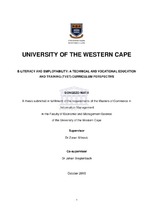| dc.description.abstract | The high rate of youth unemployment is a global phenomenon and a worrying factor. This contradicted the opportunity presented by the ICT sector, which requires e-skills, particularly e-literacy/or digital literacy skills in the entire sectors of the economy, not only ICT. Ala-Mutka (2011) defines e-literacy skills as the "basic technical use of computers and the internet". ICT skills are viewed as essential in the modern day world in order to improve individual’s chances of securing and keeping employment. Various initiatives to improve youth employability in South Africa, particularly those that are studying TVET colleges or those have already graduated. Various approaches have been adopted such envisaged by the White Paper for Post-School Education and Training of 2013 i.e. preparation for workplace, self-employment through close cooperation of TVET colleges and industry (DHET, 2013). Employers assume that graduates are familiar with computer and Internet usage. Thus, the study set the following objectives: • To understand the theoretical and contextual background of promoting employability; • To explore existing employability frameworks that might be relevant for promoting employability; • To identify and categorize the factors that are relevant for promoting employability obtained from pertinent literature; • To validate these factors by interviewing key TVET stakeholders and ICT experts; • To propose an employability framework customized for the South African context; and • To explain the use of these factors within the proposed employability framework. The objectives were realised by reviewing pertinent literature, which led to the development of an employability conceptual research framework for South Africa. A conceptual research framework that consists of five factors from the e-skills national curriculum competency framework: (i) e-skills for service delivery; (ii) e-skills for new jobs; (iii) e-skills for existing jobs; (iv) self-employment; and (v) ICT practitioner skills. In-terms of e-skills levels i.e. ICT user skills, e-business skills and ICT practitioner skills. The first three sets of e-skills are associated with ICT user skill, e-skills for self-employment are associated with e-business skills and then ICT practitioner skills. This conceptual research framework was subsequently empirically verified using an interpretive approach by interviewing key TVET stakeholders and an ICT expert. The empirical findings affirmed the validity of the above-mentioned employability factors but also uncovered two additional factors: (iv) practical experience and infrastructure. These factors were subsequently incorporated into the final employability framework for South Africa. The main contribution of this study is the fact that it brings a new employability framework for TVET colleges for the South African context, with the hope that it can be applicable in similar environments in the developing context. There are some limitations in the present study due to a small research sample that was caused by the unavailability of employed graduates. However, it is believed that this limitation did not deem the results and the academic and practical contribution of the study invalid. | en_US |

